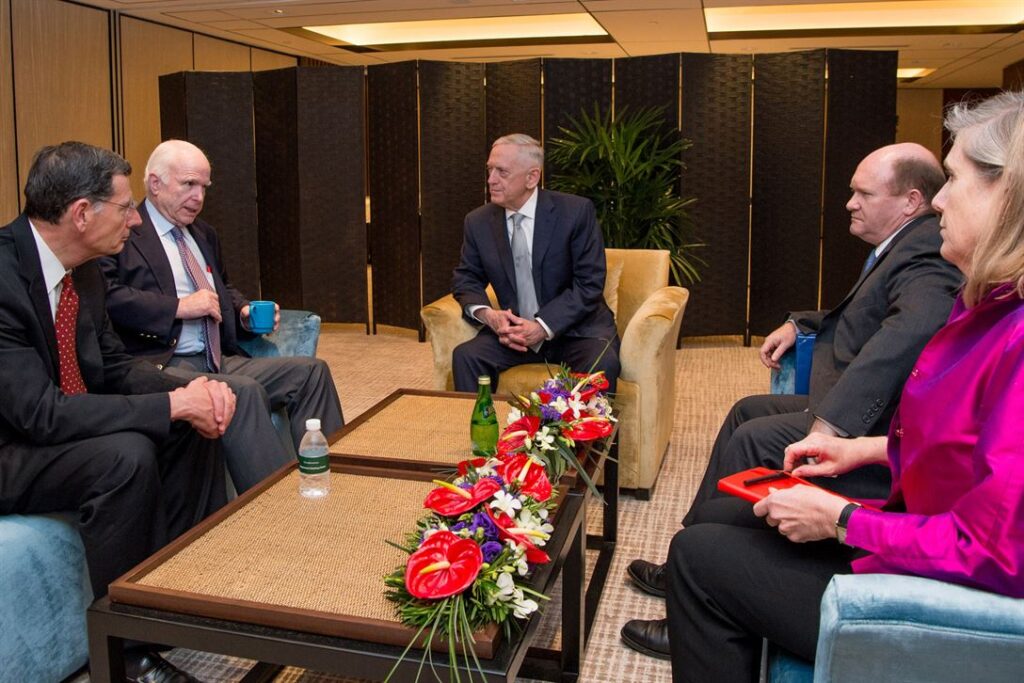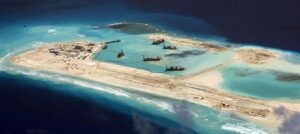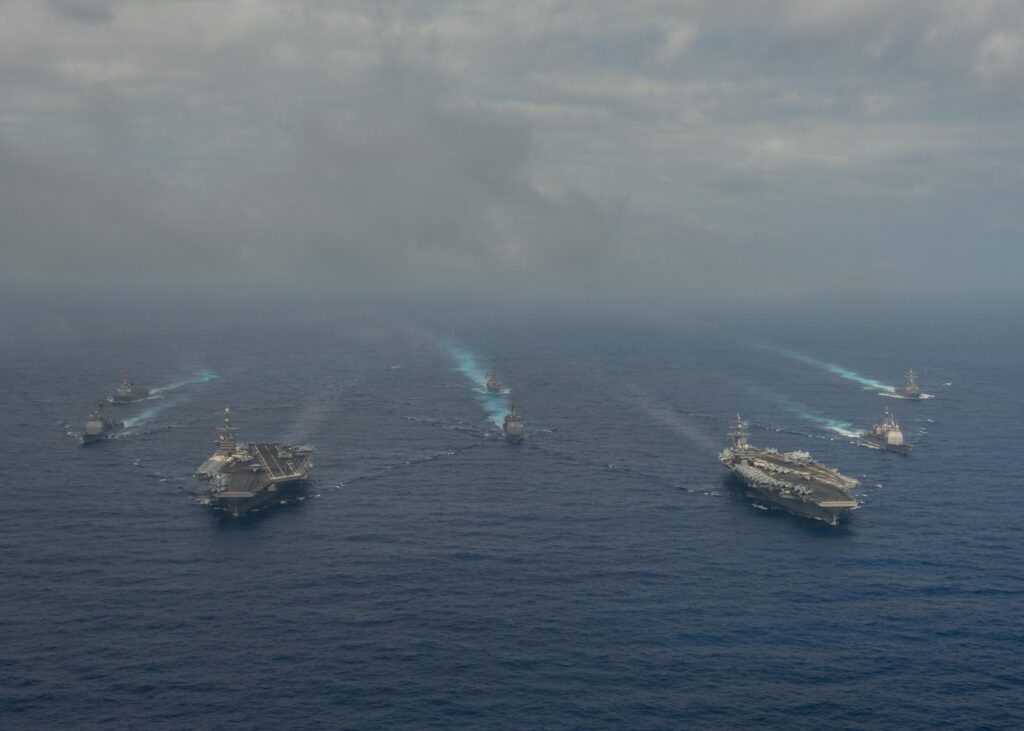US Military Advantage Eroding Coz Of BCA: CJCS Dunford
Posted on

Gen. Joe Dunford
Breaking Defense contributor James Kitfield spoke with Gen. Joe Dunford, chairman of the Joint Chiefs of Staff, during Dunford’s swing through Japan, Singapore, Australia, Wake Island, and Hawaii. Dunford testifies before Congress this week on the administration’s defense budget request. Most important, the chairman tells us he will make the case that the Budget Control Act’s caps “have to be lifted, because with them in place I cannot balance the demands of ongoing operations around the world with the need to grow capabilities in a way that maintains our competitive advantage.” This is particularly relevant as Congress hammers out the 2018 budget request over the next few weeks and thousands of diplomats, military officers, spies and members of the defense industry descend on the Paris Air Show next week. Read on! The Editor.
BD: You’ve just spent nearly a week reassuring Asian allies rattled by China’s aggression in the South China Sea and North Korea’s headlong rush to acquire nuclear weapons and intercontinental ballistic missiles. NATO allies are equally nervous about Russia’s aggression in Eastern Europe. In the Middle East allies are concerned about Iran’s destabilizing activities throughout a region beset by conflict. Meanwhile, U.S. forces are actively fighting Islamist extremists in Iraq, Syria and Afghanistan, and just in the last week there have been terrorist attacks in London, Kabul and Melbourne. How do you assess what feels like a particularly dangerous period in geopolitics?
Dunford: When I prepared to take this job I came across a recent speech given by [former Secretary of State Henry] Kissinger, who argued that this was the most complex and volatile period since World War II. Just in my first week on the job in 2015, I was confronted by Russia’s increased deployments of military forces to Syria, civilian casualties resulting from U.S. operations in Afghanistan, and a humanitarian disaster as a result of Hurricane Joaquin. Today we’re confronting simultaneous challenges posed by China, North Korea, Russia, and Iran, as well as a natural disaster in Sri Lanka. So as I prepare for posture hearings in Congress, that’s a reminder that this is the world as it is, not the world as we want it to be. In my testimony I’ll make the case that we thus need adequate and stable resourcing to make sure the U.S. military is capable of responding across a wide range of contingencies, from a major regional conflict with a near-peer competitor to combating violent extremists, and everything in between.
BD: Can the Pentagon obtain “adequate and stable resourcing” under the spending caps imposed by the Budget Control Act and sequester?
Dunford: No, we cannot. The budget caps have to be lifted, because with them in place I cannot balance the demands of ongoing operations around the world with the need to grow capabilities in a way that maintains our competitive advantage. With sequestration, constant budget instability, and Continuing Resolutions that reach deep into each fiscal year, we are unable to maintain our current pace of operations and also build tomorrow’s military force with deliberation and foresight. As you know the budget caps were designed as a poison pill that no one would want to take. Well, we’re seven years into this impasse and, one way or another, we’ve swallowed it every year.
BD: What’s the long-term impact?
Dunford: Over the last 10 years our competitive advantage in terms of projecting power when and where we need it has steadily eroded. I’m confident today that we still have a competitive advantage over any single adversary. But I’m equally confident that those advantages are eroding.
To varying degrees Russia, China, Iran, and North Korea are all developing capabilities designed to prevent us from operating freely and meeting our alliance commitments. Remember, we are still a nation that acts as a guarantor of the international order, and that carries with it big responsibilities and global interests. So my challenge is to maintain our military readiness today, while also investing in things like cyber security, electronic warfare and increased lethality so that we still have a competitive advantage when we project power in 2022 or 2024. Continuing budget instability and budget caps simply will not allow us to get there (emphasis added).
BD: What does that erosion in our competitive advantage look like from an operational standpoint?
Dunford: As Americans we should never send our men and women into a fair fight. Yet, as our decisive competitive advantage has steadily eroded over time, the costs come due in the greater time it takes to respond to a crisis, the shrinking capabilities gap between us and potential adversaries once we get there, and the higher number of casualties we will suffer as a result. I see a clear link between the erosion in our competitive advantage and the number of casualties we will have to endure to accomplish a given mission. In my view that is what this debate is really all about.

BD: One of the clearest messages that you and Secretary of Defense Mattis bought to the Shangra-La Dialogue in Singapore was that the “era of strategic patience is over” when it comes to North Korea’s nuclear weapons and long-range missile programs, Why have we lost patience, and what was the response of our Asian allies?
Dunford: President Trump made that determination, but the reason behind it is we’ve reached a point where, sooner rather than later, North Korea is going to acquire the capability to launch an intercontinental ballistic missile possibly armed with a nuclear warhead. And the recent United Nations Resolution condemning North Korea for those programs is further evidence of a shared sense of urgency about that threat, both regionally and globally.
BD: Why do you think that China will be willing to impose potentially crippling sanctions on North Korea this time, when it has resisted doing so in the past?

Chinese artificial island
Dunford: One reason is that [Secretary of State Rex] Tillerson has gone out of his way to make clear that the United States is not seeking regime change in North Korea, we simply want a denuclearized Korean Peninsula. That’s a goal that China shares. I also think North Korea’s provocative behavior has caught China’s attention, and is perceived as insulting to Beijing. So as evidenced by the two U.N. Resolutions this year condemning North Korea’s programs, I think China and the rest of the international community are approaching the North Korean threat much differently than in the past.”
BD: As the showdown with North Korea escalates, are you comfortable that you have sufficient forces in the Pacific region?
Dunford: I’m comfortable today. I won’t talk about future deployments, but we will continue to assess the situation and make recommendations to Secretary Mattis. You raise an important point though: this is a dynamic situation, and our force posture will have to reflect any changes that occur. As time goes on, I’m sure we will make further recommendations to ensure that we have the right security posture based on conditions.
BD: The Asian allies I spoke with in Singapore were deeply unsettled by some of President Trump’s controversial pronouncements and positions. As a candidate he suggested the possibility of withdrawing the United States’ protective nuclear umbrella over Japan and South Korea. He recently chastised Seoul for not footing the bill for deployment of the Terminal High Altitude Area Defense (THAAD) system to South Korea. The administration’s rejection of the Trans-Pacific Partnership (TPP) trade agreement rattled Asian allies, as did the administration’s decision to pull out of the Paris Agreement on climate change. What did you say to try and reassure our Asian allies that the United States remains committed to the region?
Dunford: To be honest, President Trump’s name never came up in my bilateral and multilateral meetings with Asian counterparts. I think they just accepted that Secretary Mattis was communicating President Trump’s positions when he spoke of our “enduring commitment” to upholding a “rules-based international order” in the Asia-Pacific region. As for cancelling TPP, the president didn’t think that particular trade pact was in our best interests. but we remain committed to close trade relationships in the region, whether they take the form of bilateral or multilateral agreements. That is something the administration is still working out.
BD: Did you detect any nervousness on the part of Asian allies about the continued commitment of the United States?

Two US carriers in Pacific
Dunford: I know there’s been noise about the United States supposedly walking away from our rebalance to Asia. That narrative is real and it’s out there in the media. But when you look at the facts, we have a pretty compelling story to tell. We are devoting 60 percent of our joint forces to U.S. Pacific Command (emphasis added), and we’ve overseen a significant increase in the volume of multilateral military exercises in Asia. We’ve deployed the newest and most capable weapons in the U.S. arsenal to the Pacific, to include F-35 and F-22 fighter aircraft and Littoral Combat Ships.
So we’re matching our actions to the message that the United States remains committed to the Asia-Pacific. And when you go country by country, and look at our military-to-military engagements with nations like Singapore, Malaysia, Indonesia, Vietnam, the Philippines, Thailand, Japan, South Korea and Australia, I will tell you that the state of those relationships is very healthy, and they are absolutely valued in the region.
BD: Part of the glue which holds those relationships together is a common fear of China’s aggressive posture in the South China Sea, where it has dredged up seven artificial islands and claimed exclusive zones around them. How do you assess China’s strategic intensions in creating those islands, especially given that it has deployed weapons on them?
Dunford: Well, we made clear to our Asian allies our continued support for a rules-based international order that requires the United States to uphold the principle of freedom of navigation by operating wherever international law allows. It’s also indisputable that China has militarized those artificial islands after promising not to do so in 2015, which tells me that they are trying to push the U.S. military further out to sea in order to prevent us from having free access to the region to meet our military commitments to allies. That’s a classic anti-access, area denial (A2AD) strategy. If you combine that with China’s pursuit of long-range anti-ship cruise missiles and rocket systems, it’s clear they are attempting to deny the United States the ability to operate freely in the region.
The second half of this interview will run Thursday morning. It’s focused on Daesh (ISIS) and the larger problem of global terrorism.
Subscribe to our newsletter
Promotions, new products and sales. Directly to your inbox.
